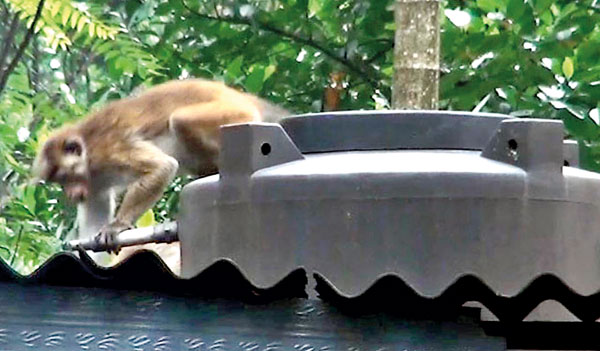News
Littering humans invite monkeys to their doorstep
View(s):By Kasun Warakapitiya
A reputed primatologist and a senior official in wildlife said that reducing the availability of food and water would be a viable solution to the human-monkey conflict
Well known primatologist, Professor Wolfgang Dittus, who lives in Sri Lanka, told the Sunday Times that purposeful feeding of monkeys at religious and tourist sites creates pest species that get used to eating human-sourced food because it is easy to obtain. That and the littering of food in the environment are major contributors to the development and sustenance of pest monkeys.
He explained that the main cause of conflict near primate habitats has been environmental conversion to agriculture. Entire populations of monkeys have been wiped out in areas of intensive agriculture or similar habitat destructive practices.
“People have killed monkeys for generations, and paradoxically, humans are also the cause for the widespread increase in numbers of monkeys near human habitation,’’ Prof Dittus said.
According to him, in cities such as Kandy and Matale the refuse generated in the wake of tourism lured omnivorous macaques towards human habitation and stimulated macaque population growth.
Even farmers who complain about crop damage do not desist from littering the environment with food scraps that attract monkeys to their properties.

The human-monkey conflict has always existed in a manageable form but has grown out of proportion over the past few decades and is attributed to a combination of natural habitat loss and the increasing amount of food that litter in the environment, according to a research, ’Assessing Public Perceptions and Solutions to Human-Monkey Conflict from 50 Years in Sri Lanka’ by Prof Dittus, Sunil Gunathilake and Melissa Felder.
A burgeoning number of widely distributed hotels, guest houses, and food services generates refuse that, in the absence of environmentally-friendly disposal systems, spills incidentally into the open environment attracting animals considered as pests, the research found.
The research says that monkey population growth and conflict are restricted to sites near human habitation, but it gives the public the illusion of country-wide overpopulation of monkeys.
Scientific investigation is critical for establishing the facts for the cause of human-monkey conflict, he said.
The director In charge of Wildlife Health of the Department of Wildlife Conservation (DWC) Dr. Tharaka Prasad said that the government had appointed a committee to collect public views on ways to control the monkey population. He is also a part of the committee.
Dr Prasad said that preventing the availability of food and water would also naturally deter monkeys from entering human habitation.
A mechanism must set up to educate and train people to not allow monkeys to be fed in populated areas. This could be done with proper waste management, he suggested.
He said that the DWC is awaiting a policy decision from the ministry.
He also pointed out that sterilising will only be effective long term as results can be obtained in five years.
The government could take a policy decision to seasonally cull macaques scientifically after estimating the population, their ecology, and areas and habitat, he said.
Dr Prasad also said that the government had earlier taken a policy decision to ban translocation, but would change the stance in the circumstances.
However, the Sunday Times learned that trans-locating would be detrimental to the monkeys as the territorial macaque groups would clash with deadly consequences.
Farmers have said the monkeys damage crops, ransack houses in search of food and damage the roofs of their homes.
| Adept at using tools By Badulla correspondent Palitha Ariyawansa Sri Lanka’s macaque monkeys have become problem solvers as in Nalapana Jathakaya where the Bodhisathwa monkey is depicted as using a bamboo straw to drink water and avoid being captured by a ‘water demon’. Likewise, the monkeys among us now, have been seen using similar tools. One was seen trying to remove a pipe connected to a water tank on top of a house in Gonagala village in Passara, Badulla, to get a drink of water.
| |
The best way to say that you found the home of your dreams is by finding it on Hitad.lk. We have listings for apartments for sale or rent in Sri Lanka, no matter what locale you're looking for! Whether you live in Colombo, Galle, Kandy, Matara, Jaffna and more - we've got them all!


